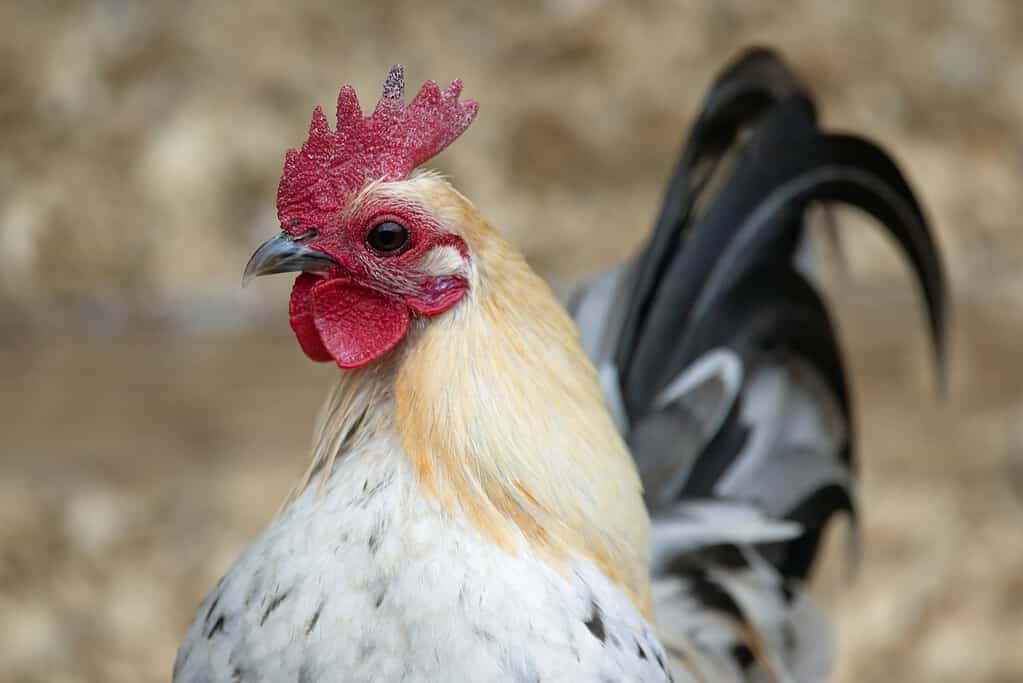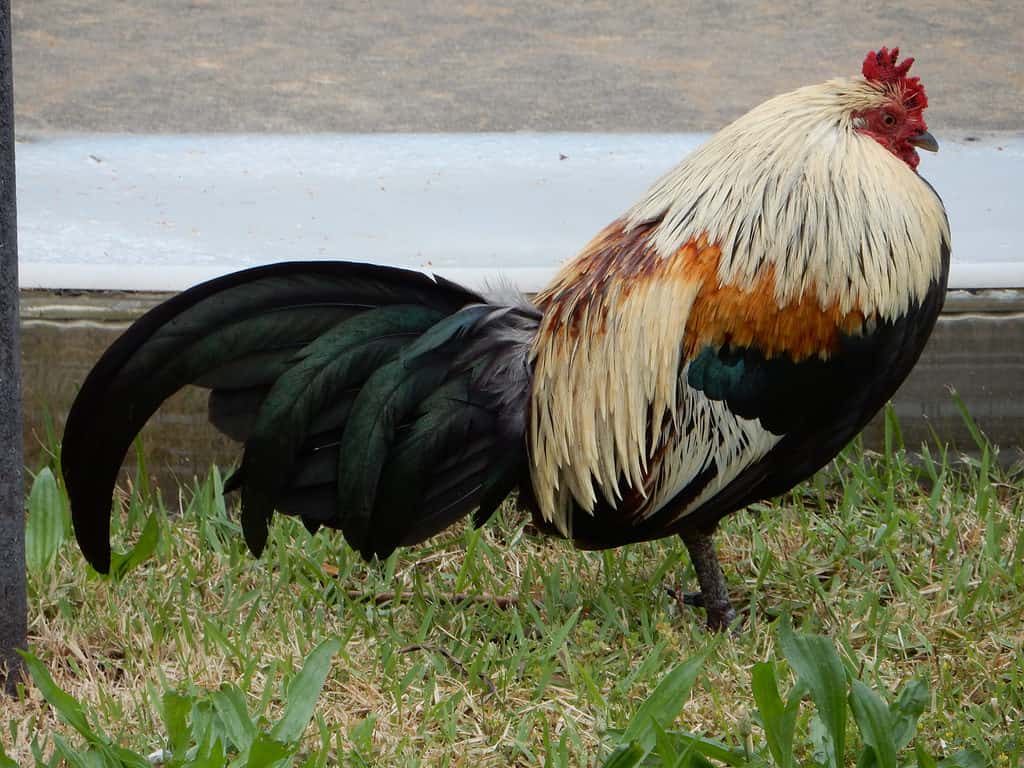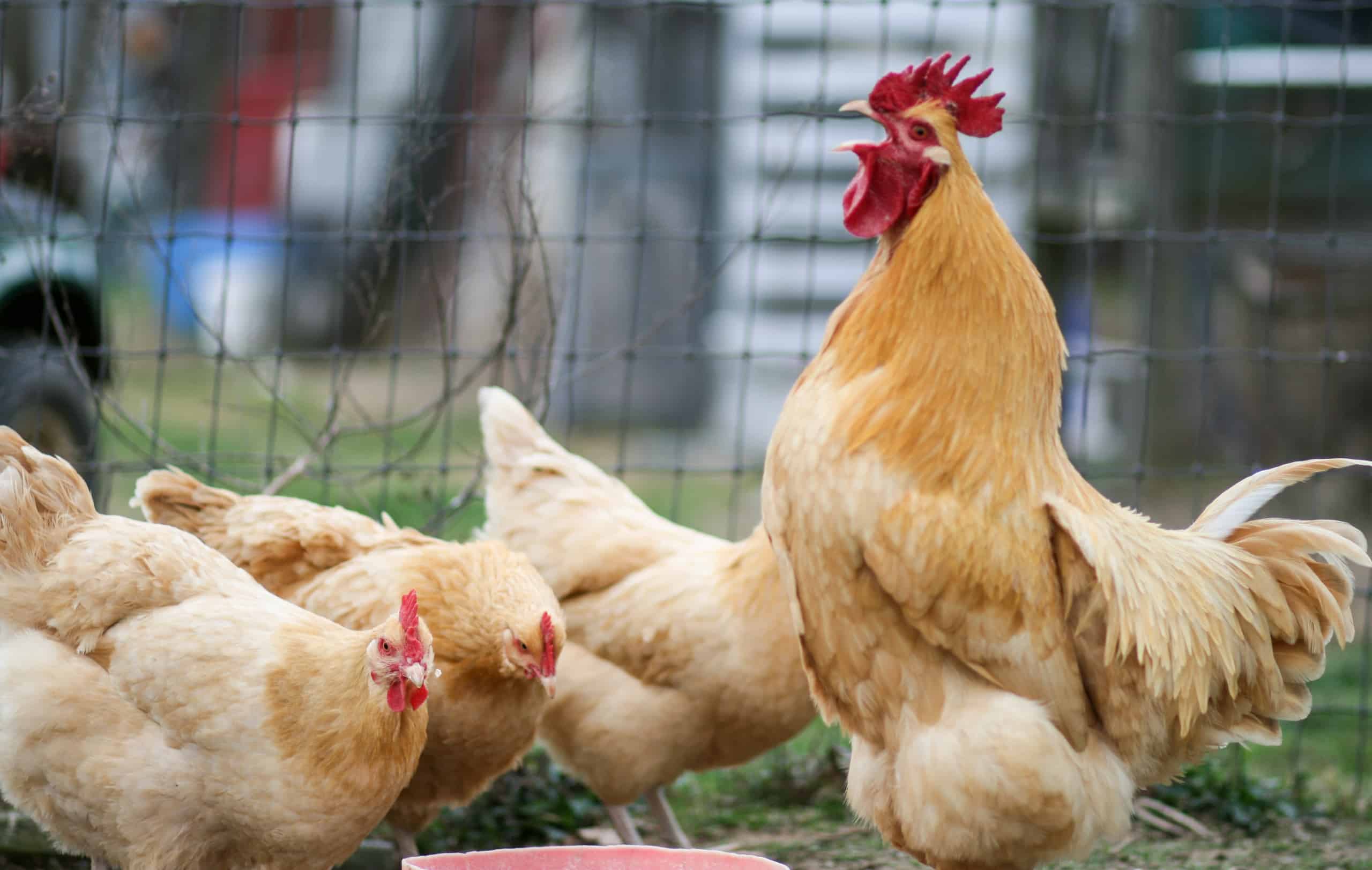Roosters (Gallus domesticus) are male chickens that reside on farms around the world. Known for their loud crow and aggressive behavior, roosters have red combs on top of their heads and red wattles below their chins, making them distinctive creatures. But do roosters actually crow?
Many people wonder whether a rooster really does “cock-a-doodle-doo” or whether it’s simply a myth. In this article, we’ll explain whether roosters crow and — if so — why they might do it.
Rooster Facts
Roosters are of the family Phaisianidae, order Galliformes, and genus Gallus. They live on farms all around the world, inhabiting Africa, Asia, Central America, Eurasia, Europe, North America, Oceania, and South America. Their main predators are foxes, coyotes, and raccoons, and their main prey is insects.
Roosters have bushy tail feathers and feathers that are brown, red, blue, black, white, and green. Their estimated population size is 23 billion, and the average lifespan of a rooster is between five to eight years (longer if held in captivity and properly cared for).

There are various types of roosters with different colorings and markings.
©JZHunt/iStock via Getty Images
Rooster vs. Chicken: What’s the Difference?
A rooster is an adult male chicken (Gallus gallus domesticus), while a hen is an adult female chicken. Simply put, all roosters are chickens, but not all are roosters. Chickens describe both genders of the animal.
Roosters have large combs (larger than those on hens) on their heads, which tend to attract hens. They mate with hens to fertilize their eggs, and the hen eventually lays eggs. Their average litter size is two to four.
Additionally, roosters are bigger in size than hens. They ensure their hens eat before they do and also protect their flock (group of chickens), warning members if there’s a threat. This is why many people believe roosters are aggressive: they’ll get protective over their flock if they feel they’re in danger. In fact, lead roosters will even establish their dominance over other roosters in a flock.
Do Roosters Really Crow?
Yes, roosters really do crow for a variety of reasons. In fact, many people know roosters as a farmer’s alarm clock, “cock- a-doodle-doo”ing at the break of dawn. However, roosters crow all throughout the day. Most roosters develop the ability to crow by the age of four months.
Why Do Roosters Crow?
Roosters cock-a-doodle-doo for various reasons, and their call can be heard from several blocks away. Here are a few of the most common reasons roosters crow.

The Wild
Burmese
rooster is extremely colorful.
©Larry Porges/Shutterstock.com
1. Marking His Territory
Roosters will often crow to mark their territories. This is an innate tendency that was bred from previous living conditions. Prior to their domestication, roosters lived in small flocks in forests and jungles. They’d use their crow to communicate with other roosters that a specific region was their territory, warning the other chickens not to come close.
2. Alerting Flock of Food
Many roosters will find food for their flocks, ensuring the hens eat before they do. When they discover a food source, they’ll use their crow to alert the flock. This will attract the rest of the chickens to know where to go to access their food. Chickens usually eat insects like beetles and grubs.
3. Saying Goodmorning
The legend is true: roosters will often cock-a-doodle-doo at the crack of dawn. This is because they have a biological clock that wakes them up at this time of day. Also, some scientists believe roosters experience a surge of testosterone early in the morning, causing them to crow.
4. Announcing a Mating Call
After a rooster mates, he will typically crow to alert other chickens. Comically, this is often viewed as a “kiss and tell” show-off tactic. However, scientifically speaking, it might just be a result of heightened hormones.
5. Establishing a Hierarchy
Many roosters will crow when attempting to establish dominance among others in their flock. Hierarchies exist within groups of chickens, and the most dominant rooster will often become aggressive and vocal toward other roosters to secure his position at the top.
6. Warning Flock of Danger
Roosters are always on the lookout for their flocks, especially when it comes to predators like coyotes, raccoons, and foxes. When they sense danger, they will alert their members by crowing. This gives the other chickens time to escape the threat or predator and seek protection.
The Infamous Rooster Crow: Bottom Line
Roosters crow for various reasons, as outlined above. While it’s common to hear the crow during early morning hours, you can experience the sheer loudness of a cock-a-doodle-doo throughout the entire day — especially if you live on or near a farm.
Thank you for reading! Have some feedback for us? Contact the AZ Animals editorial team.








